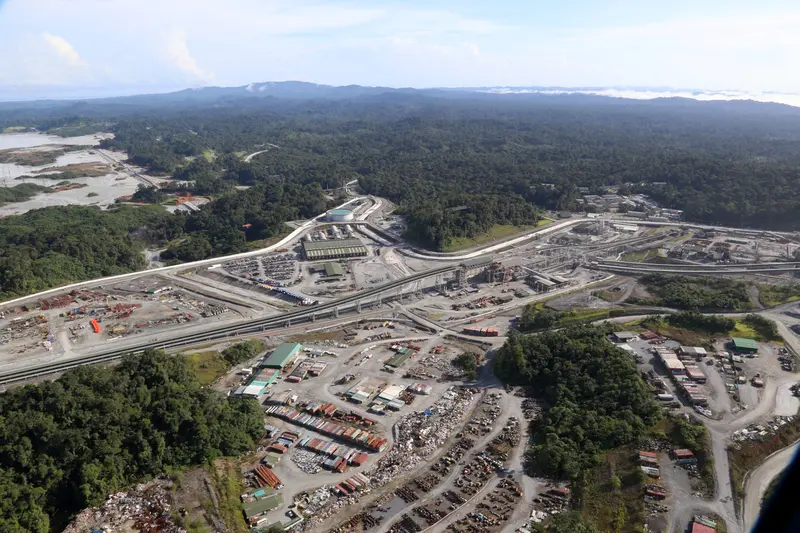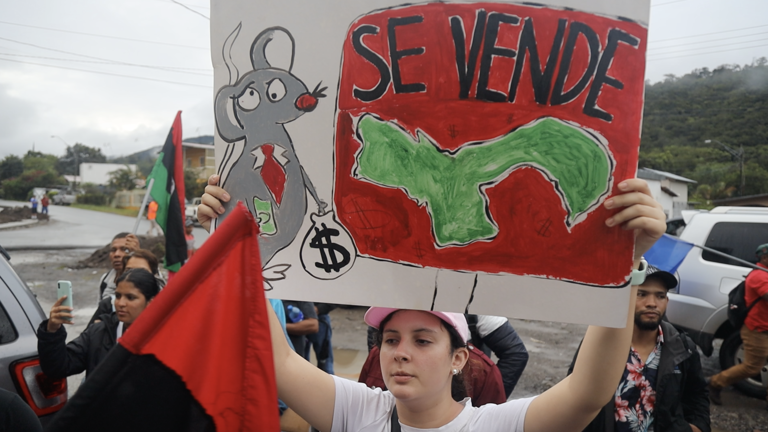
Panama: Against the sell-out of the country
Featured image: Panamanian protesters in a march against the selling of the country and against the mining concession. Source: CNN.
A series of massive protests of the people have erupted in Panama. Since Monday 23rd of October, there has been daily struggle in the streets of the Central American country. These protests have erupted due to the extension of a mining concession by the government to a Canadian monopoly. After “negotiating” for months, the Panamanian government has finally granted permission for another 20 years to the mining company to continue operating a huge copper mine.
These large mining projects are an important part of the plunder of semi-colonial and semi-feudal countries by the imperialists. We have seen similar facts in other countries such as Niger or Indonesia. The struggles against imperialist mega-projects are an important aspect of the popular struggle against imperialism, especially in Latin America. There, the case of Mexico against the ill-called “Mayan Train”, or against the CIIT, stands out. We have been reporting on these cases before.

Panoramic of the large copper mine owned by FQM. Source: Bloomberg.
The large mine mainly exploits copper and would be the third largest copper mine in the world, and its between 3 and 3.5% of Panama’s GDP. In addition, it would supposedly provide employment for thousands of Panamanians and would be 80% of the value of the Central American country’s total exports. The holding company is Minera Panamá S.A. (MPSA), whose capital is 90% formed by the Canadian monopoly First Quantum Minerals (FQM). Other of the largest copper mines in the world are also owned by this monopoly. Investments in this mine began years ago, and from the beginning this mine had numerous investigations and complaints, especially focused on the environmental damage caused. What underlies this damage to nature is the damage caused to the people who live around it, especially the peasantry whose lives depend on the countryside and who see their rivers and fields polluted. Furthermore, the foreign monopoly has completely ignored and denied these accusations, which makes clear the way in which monopolies act in oppressed countries, doing and undoing as they want.
The Panamanian people have decided not to take this situation anymore and to take the streets to protest. The bourgeois media of Latin America reports that the Central American country is paralyzed, the streets are blocked, mobilizations and strikes that have been supported first by education and construction workers, and later by many other sectors such as workers, transportation workers, doctors, activists of all kinds, etc. Also there are clashes between protesters and the police. The protesters also set up barricades and attempted to assault the Panamanian government headquarters. After just one day of mobilizations, it was announced that five police officers were injured in the clashes and 48 protesters were arrested.

Protesters with a poster which says “Panama for sale”. Source: The World.
The bourgeois media sells the illusion that by going to the country’s courts or international justice, they can stop the action of the monopolies. In this case, the monopolies’ media stated in their news that the mining concession could be canceled due to a decision by the Supreme Court of Panama, and with this, the protests would stop. With this type of news they want to stop a struggle that has been capable of paralyzing the country. But what these media -intentionally – ignore is that the Supreme Court has already declared unconstitutional the previous mining concession to this Canadian monopoly. But the government continued to act and the company began its mining exploitation and pursued with its investments without problems.
These types of protests are frequent in semi-colonial and semi-feudal countries. In these countries, the political leaders, part of the local ruling classes and they are faithful servants of imperialism and they legislate in the interests of foreign monopolies and sell the country for a handful of crumbs. But against this anti-popular policy on the part of the comprador and bureaucratic bourgeoisie of the oppressed countries, the people struggle day after day against imperialism and its lackeys.

